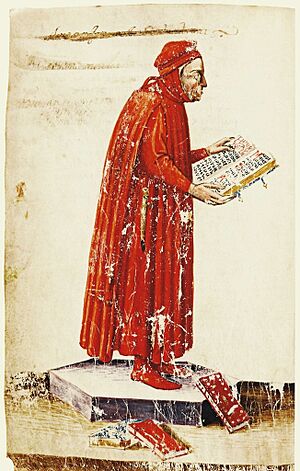Coluccio Salutati facts for kids
Coluccio Salutati (born February 16, 1331 – died May 4, 1406) was an important Italian humanist and a public official. He was one of the most significant political and cultural leaders in Renaissance Florence. As the Chancellor of the Republic of Florence, he was like a permanent secretary of state. He held this powerful position for many years before the famous Medici family rose to power.
Contents
Early Life and First Jobs
Salutati was born in Stignano, a small town near Buggiano in Tuscany. He studied in Bologna. Later, his family returned to Buggiano, which was then part of the Republic of Florence.
Coluccio worked as a notary, which is like a public secretary, and continued his studies. He met famous Florentine humanists like Boccaccio. His excellent Latin letters earned him the nickname "Ape of Cicero" because he wrote so well, just like the ancient Roman orator Cicero.
In 1367, Coluccio became chancellor of Todi, a city in the Papal States. He also worked in Rome for Pope Urban V from 1368 to 1370. In 1370, he became chancellor of Lucca, another powerful Tuscan city. However, he quickly lost this job due to local conflicts.
Leading Florence as Chancellor
In 1375, Coluccio Salutati was appointed Chancellor of Florence. This was the most important job in the government of the Florentine Republic. As Chancellor, Salutati was in charge of writing official letters to other countries. He also drafted secret instructions for ambassadors and helped with diplomacy and treaties. He was known for his legal knowledge, political smarts, and great writing skills.
His abilities were soon tested when Florence faced a war with the Pope. Salutati tried to assure Pope Gregory XI that Florence was still loyal. Even though he couldn't stop the war, Salutati became famous across Italy for his formal letters.
Gian Galeazzo Visconti, the Duke of Milan and a rival of Florence, once said that one of Salutati's letters could "cause more damage than a thousand Florentine horsemen." This shows how powerful his words were. Salutati wrote a book called De tyranno (On the Tyrant) in 1400. In this book, he discussed what a good ruler should be like.
Florence valued his service so much that the city paid for his funeral in 1406.
Important Cultural Achievements
Coluccio's impact on culture was perhaps even greater than his political work. He was a skilled writer and speaker. He used the style of ancient Roman writers like Virgil and Cicero in his prose. Salutati believed in learning from ancient times not just to copy it, but to create something new.
He admired the famous poet Petrarch and spent much of his money collecting books. He gathered about 800 books for his personal library. He also searched for old classical manuscripts. One of his most important discoveries was Cicero's lost Letters to his Friends. These letters showed Cicero as a strong supporter of republican freedom. Coluccio also studied history, linking Florence's beginnings to the Roman Republic, not just the Roman Empire.
He supported younger humanists, helping them with their work. Some of these included Gian Francesco Poggio Bracciolini and Leonardo Bruni.
In 1397, Salutati brought the Byzantine scholar Manuel Chrysoloras to Florence. Chrysoloras taught one of the first courses in Greek in Western Europe since the end of the Roman Empire. Before this, very few people in the West could read or speak Greek. Many important ancient Greek works of science and philosophy were not available in Latin. By bringing Chrysoloras to Florence, Salutati made it possible for scholars to read the original works of Aristotle and Plato in ancient Greek.
See also
 In Spanish: Coluccio Salutati para niños
In Spanish: Coluccio Salutati para niños
 | Toni Morrison |
 | Barack Obama |
 | Martin Luther King Jr. |
 | Ralph Bunche |


